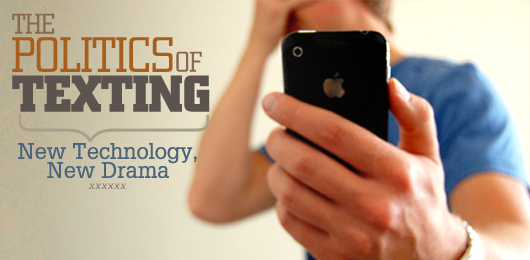Text messaging may be an efficient and fast method of communicating, but as with email, the inability to be sure what exactly someone is trying to say, and how, often creates unnecessary headaches.
By Adam Baxter
Is a kiss just a kiss? Not anymore apparently!
Text messaging is rapidly taking over as the number one form of communication between young adults, fueled to a certain extent by the popularity of shows such as Gossip Girl, as well as ‘icons’ like Paris Hilton, who is rarely seen without a diamond-encrusted cellphone or three.
But while many of us are happily texting away obliviously, there are some people out there who read far deeper into what appears on screen – so much so that I am finding more and more conversations with friends dominated by the content of certain SMS messages. “Who is texting whom, and did they put a kiss?” Politics is coming into play, or, to put it another way, welcome to the strange world of politexts.
The big issue in politexts seems to be, as mentioned above, whether or not a text message is ended with a closing compliment, sometimes signaled with an x (kiss). Never in its history has this letter, so often overlooked along with its friend’s q, y and z, been the subject of such scrutiny. The dilemmas appear to revolve chiefly around the following:
Scenario 1: Mr X – or rather for sake of ease let’s call him Mr J – sends a girl a text. At the end of the message he puts a standard x. While he may just be polite, the guy may not realize that depending on how the girl reads the message, he may have introduced unintended significance by adding one extra letter. But if he then proceeds without adding the kiss – even just once – Mr J has now lost all interest, or at best is ‘mad’ at girl.
Scenario 2: Mr J again (he’s quite popular) texts initially without an x, perhaps because he is in a hurry, but sends the implied meaning he’s not as keen as girl had hoped. A future message, however, is laden with them. In politexts, this signifies a positive change of affection.
Maybe I’m being a little cynical, but on numerous occasions I have had to debate the implication of x – or lack thereof. And apologies to any women reading, as, alarmingly, it’s not always just the opposite sex obsessing over such matters, but men too (although the obliviousness of the situation does tend to be a male trait).
So what can be suggested? Firstly, to the guys. There’s a whole lot of texting going on, but never forget – girls still talk. If you’re sporadic with your kisses then there’s going to be a whole lot of discussion going on, and you may inadvertently rub her the wrong way — or the unintended right way. The best advice is to be consistent – lay your ground and stick to it!
Secondly, to the receiver. You have to realize that not everyone is debating whether or not to x you or not – surely what the text actually says is more important than whether it is sealed with a kiss (and let’s not even start with ‘xos’, ‘bffs’, or ‘ttyns’).
If we all just say what we mean, there will not have to be any ‘reading into' required.
Life is hard enough without throwing politexts into the bargain. There has to be some mutual understanding, because otherwise, we all just sound like 14 year old girls.















